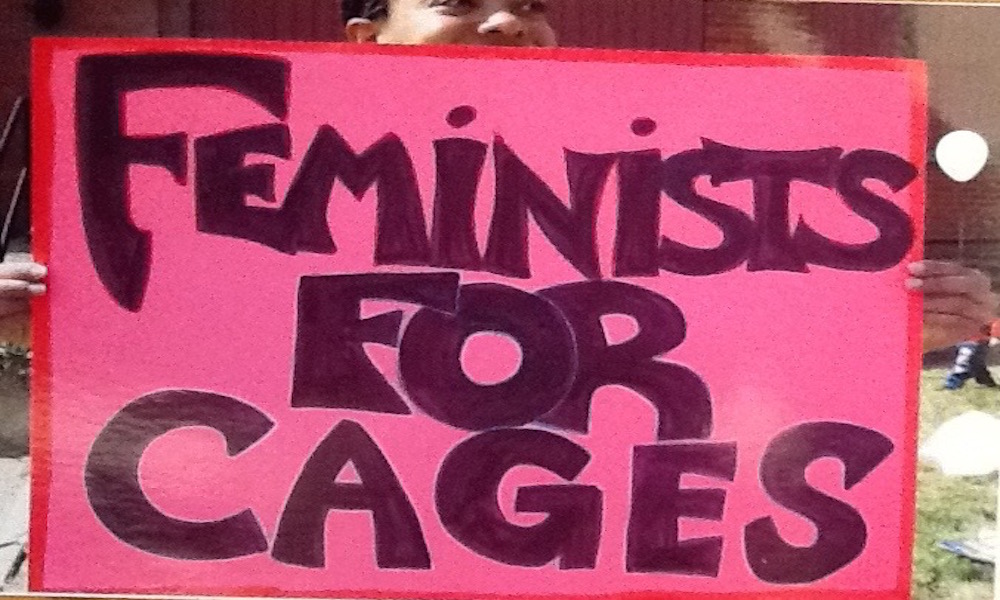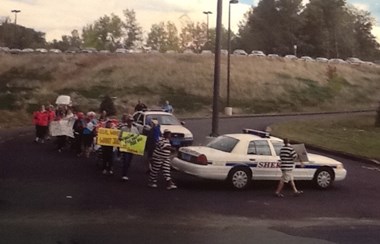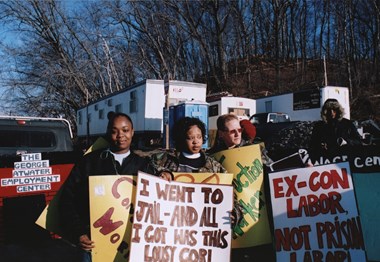Blog
Massachusetts Statewide Harm Reduction Coalition

Credit: Courtesy of Arise for Social Justice Records, Sophia Smith Collection, Smith College, Northampton, MA.
Statewide Harm Reduction Coalition (SHaRC) demonstration in Chicopee, MA (2006). A demonstrator holds a sign that reads, “feminists for cages,” which is an ironic reference to arguments that building women-specific jails would benefit women. The construction of women-specific jails and prisons has been supported by three main arguments: issues of overcrowding, proximity to family and support, and the need to provide women with “a place of their own.” In 2005, Sheriff Michael Ashe said that the facility in Chicopee would “serve the women’s population better.” SHaRC responded saying that women would be best served by remaining in their communities and having access to affordable housing, food, job opportunities, childcare, quality education, and health care. They argued that building healthy communities requires investments to provide people with these needs, rather than promoting punishment in the criminal justice system.
Statewide Harm Reduction Coalition (SHaRC), “Why Women Are Not Best Served By Incarceration” (March 8, 2006): http://www.massdecarcerate.org/women_paper.html

Courtesy of: Arise for Social Justice Records, Sophia Smith Collection, Smith College, Northampton, MA.
Statewide Harm Reduction Coalition (SHaRC) demonstration in Chicopee, MA (2007). This demonstration is one of many actions organized by SHaRC members between 2003 and 2006 to contest the need for a new women’s prison in western MA. Despite protests from SHaRC and community members, the Western Massachusetts Regional Women's Correctional Center (WMRWCC) opened in September 2007 and expanded in 2012. SHaRC members organized educational events monthly, each with a theme such as “Homes not Jails” and “Healthcare not Jails.” During these themed demonstrations, protesters advocated for policy changes that would establish alternatives to incarceration, or measures that would prevent incarceration in the first place. They emphasized the need for community centers, jobs, housing, and health care.

Courtesy of: Arise for Social Justice Records, Sophia Smith Collection, Smith College, Northampton, MA.
Solobia Hutchins, Ruby King and Holly Richardson of the Massachusetts Statewide Harm Reduction Coalition (SHaRC) protest at the construction site of a new women’s jail in Chicopee, Massachusetts, in 2006.
Protesters emphasized the need to “deconstruct” the ideology of women’s prisons, and “reconstruct” viable community alternatives. SHaRC has worked to “deconstruct” this ideology by challenging assumptions that women-specific prisons and jails would serve women better, and instead recommending that communities invest in health care, education, and job opportunities.
“Simply put, the best way to address overcrowding is to depopulate the jails, replace them with social and economic justice. The best way to address incarceration far from home is to not incarcerate women in the first place.”
Statewide Harm Reduction Coalition (SHaRC), “Why Women Are Not Best Served By Incarceration” (March 8, 2006): http://www.massdecarcerate.org/women_paper.html